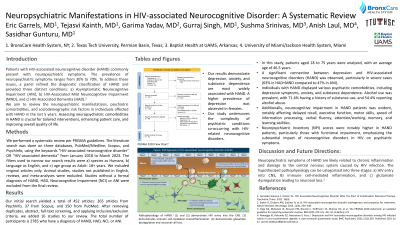Infectious Disease and HIV Psychiatry
Session: Poster Session
(078) Neuropsychiatric Manifestations in HIV-associated Neurocognitive Disorder: A Systematic Review

Trainee Involvement: Yes
- EG
Eric Garrels, MD
Resident
BronxCare Health System
Bronx, New York, United States .jpeg.jpg)
Tejasvi Kainth, MD
PGY1 Resident Physician
BronxCare Health System
New York City, New York, United States
Anish Laul, MD
Psychiatry Resident
University of Miami/Jackson Health System
Miami, Florida, United States- sS
sushma Srinivas, MD
Resident
Baptist Health at UAMS
LittleR ock, Arkansas, United States 
Sasidhar Gunturu, MD
Program Director
BronxCare Health System
New York, New York, United States
Presenting Author(s)
Co-Author(s)
1. Heaton RK, Clifford DB, Franklin DR Jr, et al. HIV-associated neurocognitive disorders persist in the era of potent antiretroviral therapy: CHARTER Study. Neurology. 2010;75(23):2087-2096. 2. Wang, Yunhe et al. “Global prevalence and burden of HIV-associated neurocognitive disorder: A meta-analysis.” Neurology vol. 95,19 (2020): e2610-e2621. doi:10.1212/WNL.0000000000010752 3. Namagga, Jane Kasozi et al. “Depression and HIV associated neurocognitive disorders among HIV infected adults in rural southwestern Uganda: a cross-sectional quantitative study.” BMC psychiatry vol. 21,1 350. 12 Jul. 2021, doi:10.1186/s12888-021-03316-w
Objective: Patients with HIV-associated neurocognitive disorder (HAND) commonly present with neuropsychiatric symptoms. The prevalence of neuropsychiatric symptoms ranges from 30% to 70%. Depression, anxiety, and cognitive impairment are most widely associated with HAND, followed by apathy, sleep disturbances, and irritability. We aim to review the prevalence, clinical features, and impact of neuropsychiatric manifestations in individuals affected with HAND in the last 5 years.
Methods: We performed a systematic review per PRISMA guidelines. The literature search was done on three databases, PubMed/Medline, Scopus, and PsychInfo using the keywords ``HIV-associated neurocognitive disorder” OR “HIV-associated dementia” from January 2018 to March 2023. The filters used to narrow our search results were a) species as Humans, b) language as English, and c) age group as Adult: 19+ years. We included original articles only, and animal studies, studies not published in English, reviews, and meta analysis were excluded.
Results: Our initial search yielded a total of 452 articles; 265 articles from PsychInfo, 37 from Scopus, and 150 from Pubmed. After removing duplicates, we screened a total of 447 for the systematic review. In our review, depression was the most common psychiatric manifestation in patients diagnosed with hand, followed by anxiety and apathy. The severity of neuropsychiatric symptoms was associated with the severity of cognitive impairment, viral load, CD4+ T cell count, and longer duration of HIV infection. We observed that neuropsychiatric presentations were more common in older age groups and individuals with a history of substance use.
Discussion: Neuropsychiatric symptoms of HAND are likely related to chronic inflammation and damage to the central nervous system caused by HIV infection. The hypothesized pathophysiology can be categorized into three stages: a) HIV entry into CNS, B) immune cell-mediated inflammation, and c) glutamate dysregulation leading to neuronal loss.
Conclusion: Our ongoing study provides insights into the prevalence of neuropsychiatric symptoms in HAND, with depression as the most commonly identified association. Assessing and managing these symptoms is crucial to improving quality of life and functional outcomes in patients affected with HAND.
References:

